Davyhulme WwTW Modernisation Project (2016)
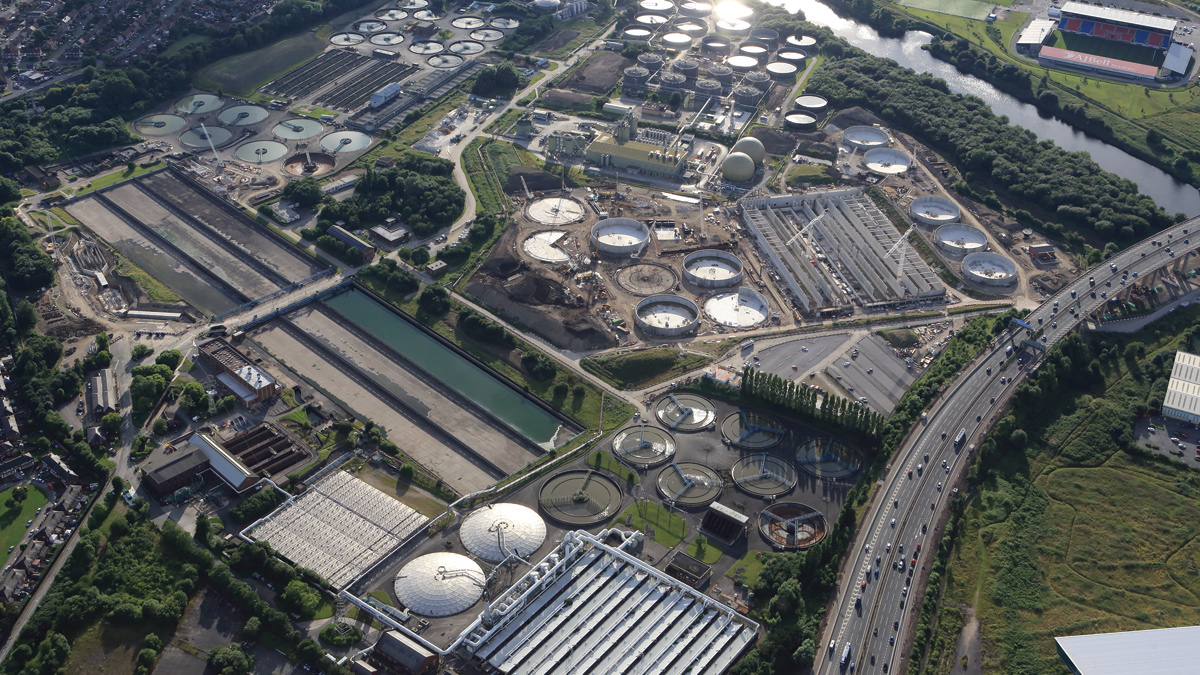
Davyhulme WwTW - Courtesy of United Utilities and Laing O’Rourke
Located in the North West of England, Davyhulme wastewater treatment works (WwTW) is United Utilities largest works, serving over 1 million customers across Greater Manchester. The works are currently facing several future challenges, namely (i) the tightening of the ammonia (NH3) permit limit from 3mg/l to 1mg/l to comply with the requirements of the Freshwater Fish Directive, (ii) MCERTS flow measurement for flow to full treatment and (iii) addressing the impact of significant local population and trade growth to appropriately size the quality solution to a 2035 design horizon. Add the works ageing assets to this list, it is clear that major investment is required to ensure Davyhulme can cope with challenges of the 21st Century, like population growth and changing weather patterns.
Background
The key primary and secondary treatment assets date back to the 1960s and 1970s and, compared with modern activated sludge plants, these assets are now inefficient. The tightening of permit limits and population growth present a risk that the plant may become even more inefficient in the future.
United Utilities recently invested in the Sludge Processing and Recycling Centre (SPARC) and refurbishment of the Biostyr Biological Aerated Flooded Filter (BAFF) plant at Davyhulme, however additional investment is needed.
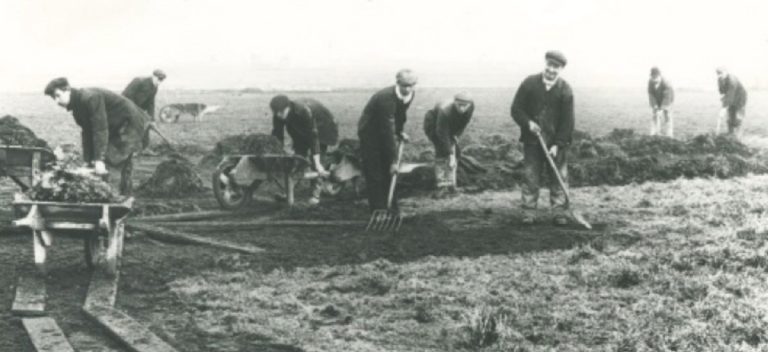
Former Davyhulme sludge drying beds circa 1900 – Courtesy of United Utilities and Laing O’Rourke
What is required?
The works are currently undergoing a £200m modernisation project to construct a new activated sludge plant (ASP) and associated works. The ASP is a nitrifying plant and will take 60% of the works flow. The existing feed to the BAFF plant (tertiary nitrification) will fall to 40% of current flows, improving the performance and resulting in significant power and chemical consumption savings. The works will treat flows up to full treatment (FTFT) of 8,264l/s through a new inlet works with 60% of the FTFT being conveyed to 6 (No.) new primary settlement tanks (PST), a ten-lane aeration plant and 10 (No.) final settlement tanks (FST). The project also includes a new interstage pumping station (PS), interconnecting pipelines and an upgrade of the existing works control system.
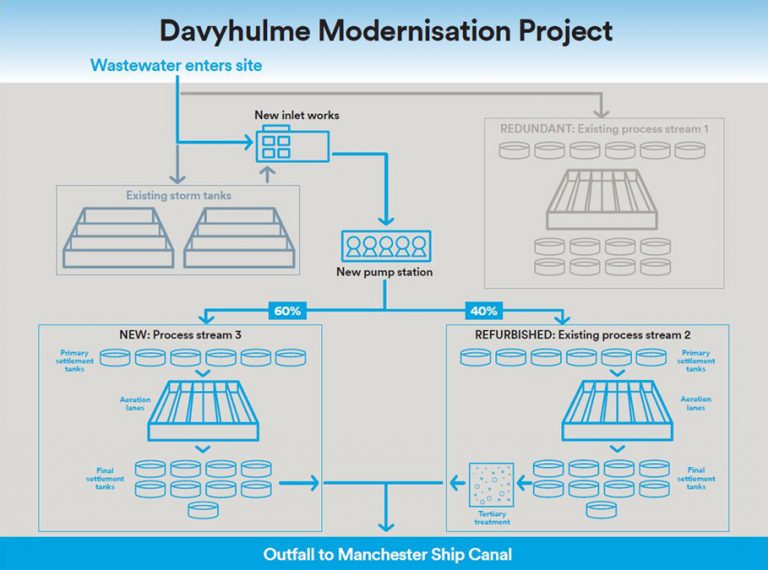
Davyhulme WwTW moderisation – Courtesy of United Utilities and Laing O’Rourke
Undertakings
The scheme is the largest live water project currently being constructed in the UK. It is a collaborative design and build scheme between United Utilities, the principal contractor Laing O’Rourke and a joint venture civil design team of Arcadis and Mott MacDonald.
The contract for the project was awarded on 5 January 2015 to undertake the following works:
Construction and commissioning of:
- A new FTFT inlet works.
- MCERTS flow measurement.
- FOG (fats oil grease) removal system.
- 6 (No.) primary settlement tanks.
- 10-lane activated sludge plant (ASP).
- 10 (No.) final settlement tanks.
- ASP pumping station.
- New HV power supply.
Refurbishment of:
- Odour control plant.
- Existing Inlet works (to become storm works).
- Existing sludge pumping stations.
Davyhulme WwTW Modernisation Project: Design team, principal contractor, specialist sub-contractors and suppliers of plant & equipment
- Principal contractor: Laing O’Rourke
- ASP precast elements: Explore Manufacturing
- MEICA and process design: Laing O’Rourke
- PST and FST scrapers/penstocks: Ham Baker Adams
- Civil, geotechnical and hydraulic design: Arcadis/Mott MacDonald JV
- ASP3 feed pipework system (aeration pipework and service platforms): Franklyn Yates Engineering Ltd
- ASP anoxic mixers and fine bubble diffusers: Xylem Water Solutions
- Physical modelling/CFD analysis: Hydrotec Consultants
- Specialist steel pipework fabrication: Powerrun Ltd
- Piling contractor: Expanded Piling Keller Group
- Electrical contractor: Lloyd Morris Electrical Ltd
- Abetong precast tank wall sections: Bison Manufacturing
- Remediation/earthworks: Celtic Technologies PP O’Connor
- Splitter chamber: Pipex px
- Transport/logistics: Explore Transport
- Screw pump refurbishment: Spaans Babcock Ltd
- Plant hire/site offices: Select Plant Hire
- Detritor refurbishment: Jacopa
- Inlet works coarse screens: Huber Technology
- Sludge thickeners: Andritz
- Inlet works fine screens: Longwood Engineering
- HV design and installation: Smith Brothers
- Inlet works screenings handling: Huber Technology
- Systems integration and control system: Cordell Group
- Odour control ductwork and OCU refurbishment: Plasticon UK Ltd
- Aeration pipework and service platforms: Crown House Technology Manufacturing
- Axial flow pumps: Bedford Pumps
- High speed turbo blowers: Sulzer Pumps
Earthworks and remediation
Davyhulme WwTW is built on the former course of the River Irwell which was diverted to form the ship canal in 1893. Since 1894, Davyhulme has seen continuous development associated with wastewater treatment including the invention of the activated sludge process in 1914.
The former sludge drying beds and solids/liquid separation area where the new plant will be built was previously used to stockpile waste materials from the treatment process. Before construction work began on the modernisation project this area needed remediating and clearing. With the help of a comprehensive materials management strategy, the vast majority of the 200,000m3 of earthworks has been reused as fill, minimising off-site movements.
Geotechnical design
The project team carried out in-depth analysis of primary and secondary settlement levels between piled structures (in particular for pipelines) focusing on pipe joint rotation and overall settlement. The data allowed the team to rationalise the geotechnical design to ensure net unloading on the ground and removing the need for piles at the inlet works.
Even with significant efforts to reduce the amount of piles, over 5,500 have been installed as part of the works to date, making it the largest live piling operation in the UK.
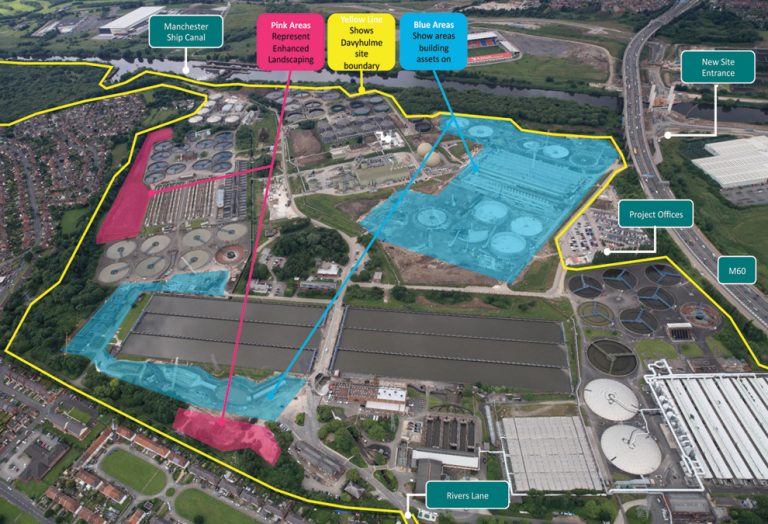
Aerial view of the main project working areas on Davyhulme WwTW – Courtesy of United Utilities and Laing O’Rourke
Design for manufacturing and assembly (DfMA)
The design and construction of the ASP builds on the expertise gained in the major upgrades of previous water industry projects, where the use of precast elements and off-site manufacture provided significant benefits for site safety, time and cost compared to traditional construction on site.
At Davyhulme WwTW, the same expertise and further innovation has been applied. This has required close liaison between the design disciplines to ensure each component provides the necessary structural and functional requirements.
There is little storage space on site, but by developing a detailed component tracker for coordinating production, delivery and off loading of the off-site production, each component is delivered just-in-time to maximise installation efficiency and optimise hook time. Installation of cast-in items also reduces the requirements for drilling and fixing on site.
Inlet works
Davyhulme WwTW is fed by 3.05m and 3.96m diameter sewers, which carry flows of up to 30,706l/s from the Manchester catchment area. Flows to full treatment of 8,264l/s are split between 2 (No.) ASPs and fed through 6 (No.) escalator screens.
Following modifications and refurbishment, the existing inlet works will become a storm screening facility and a new inlet works, consisting of coarse screening and separate fine screening facilities, will be installed. A new liquid waste tanker import facilities and improvements to the MCERTS flow measurement systems will also be provided.
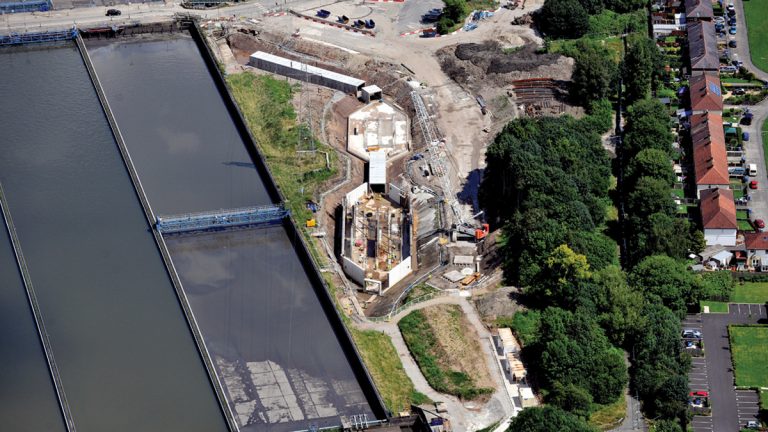
New inlet works under construction – Courtesy of United Utilities and Laing O’Rourke
3 (No.) 3m wide coarse screens will remove solids above 40mm in one dimension, and flows will carry on to 4 (No.) 2.5m wide fine screens that will remove solids of 6mm and above in two dimensions, all housed in odour controlled buildings. Screenings will be washed and dewatered prior to discharge to skips.
Flows will continue to the existing screw lift PS and refurbished detritors. A new grit skip system with duty/standby skips and odour control will be provided to the reused process units.
ASP3 pumping station (PS)
Following preliminary treatment, FTFT is divided between the existing ASP2 process stream and the new ASP3 process stream in a ratio of 60:40 under normal flow conditions. To achieve this, an actuated weir penstock will govern flows to ASP2. ASP3 will be fed from a new interstage pumping station housing 5 (No.) variable speed suspended bowl axial flow pumps. The 5 (No.) 900mm outlets discharge into a single 1,800mm diameter rising main that transfers flow approximately 700m to the head of the ASP3 process stream.
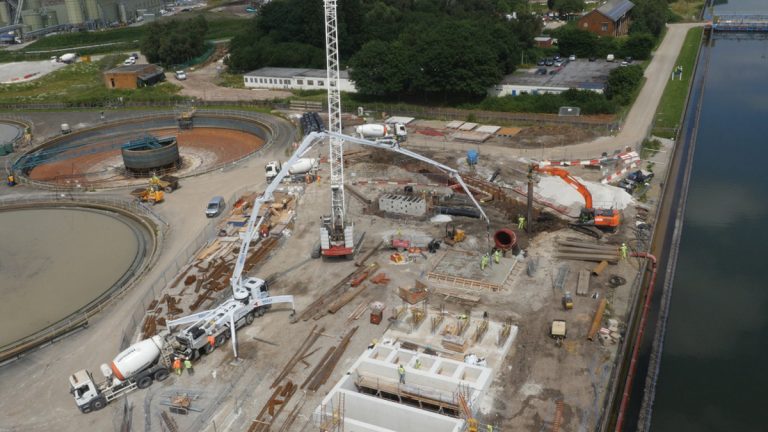
Pumping station under construction – Courtesy of United Utilities and Laing O’Rourke
Storm return flows and sludge processing liquors are pumped to a flow splitter chamber adjacent to the pumping station. The project team have taken an innovative approach to the construction of the splitter chamber due to the complexity, size and associated risks. A sectional, plastic DfMA solution was developed and built off site in three sections. It was then delivered to site ready for lifting into position and fixing, with all reinforcement and formwork preinstalled in the factory ready for concreting.
The current plan is to build the connections into the existing channels at the end of September 2016 and turn flows into the structure by early November 2016. The pumps are due for delivery in January 2017.
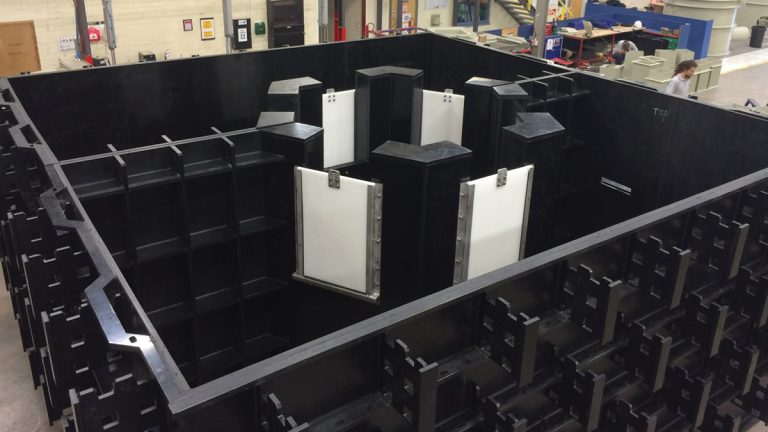
Splitter chamber during manufacturing – Courtesy of Pipex
New process stream 3 (ASP3)
Construction of the new ASP3 process started with piling in October 2015. The new plant includes 6 (No.) 41m diameter primary settlement tanks (6,128m3 each), a ten-lane propped cantilever ASP with a footprint of 175m x 110m x 8m deep (total volume 137,087m3) and 10 (No.) 46m diameter FSTs (9,178m3 each).
Primary settlement tanks (PST)
The PSTs are formed using a precast concrete Abetong wall panel system with a piled traditional cast in situ sloping base. Odour from the tanks will be contained by an innovative PVC fabric and lightweight aluminium cover that has been developed between Ham Baker Adams and the project team.
M&E installation of the scraper systems is planned to start at the end of August 2016, as is the construction completion of the distribution chamber.
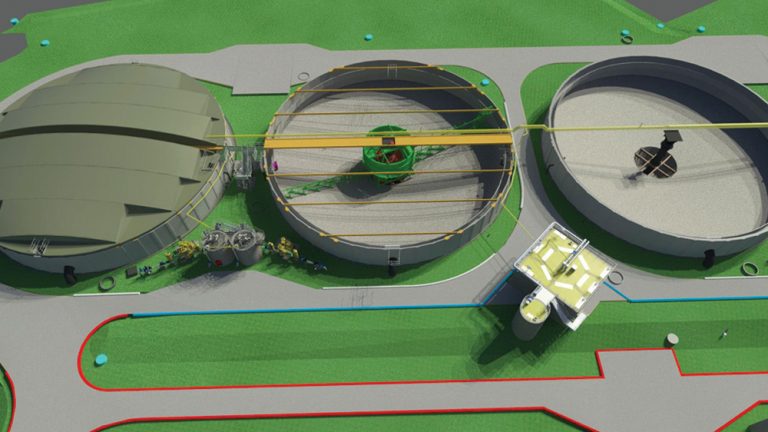
Model extract showing PSTs and scraper bridge – Courtesy of United Utilities and Laing O’Rourke
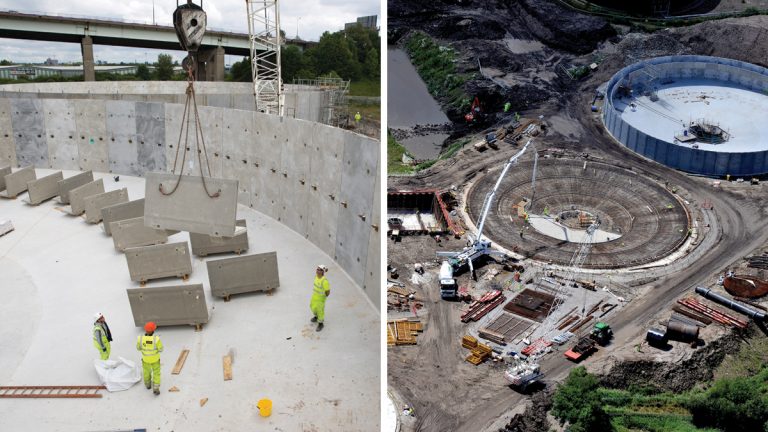
(left) Installation of the precast weirs in a PST and (right) PST under construction – Courtesy of United Utilities and Laing O’Rourke
Activated sludge plant (ASP)The new Davyhulme WwTW ASP is the largest monolithic structure of its kind in the United Kingdom and the unique hybrid design of precast and cast in situ elements is pushing the boundaries of DfMA innovation.
Primary settled flows enter the tank and are mixed with return activated sludge (RAS) flows of up to 4,727l/s through a 21m long bulk mixer. The 7,111m3 common anoxic zone uses 8 (No.) mixers to maintain a homogenous blend prior to entering 10 (No.) aeration lanes (155m long, 12,94m3 each), which are fitted with fine bubble diffused air grids.
Each 10m wide lane comprises 2 (No.) 15m long (normally anoxic) swing zones and 4 (No.) 30m long aeration zones.
A twin wall precast panel system from Explore Manufacturing in Worksop was used for the walls of the ASP tank however these were limited to 6m height. The team adopted a DfMA/hybrid approach with the lower 4m height of the tanks walls cast in concrete on site and tied to the piled base and the precast panels placed above.
Cast in situ stitch details link the panels together and precast walkways on top of the walls provide access for operation. Again this offered significant programme benefits over a fully cast in situ system.
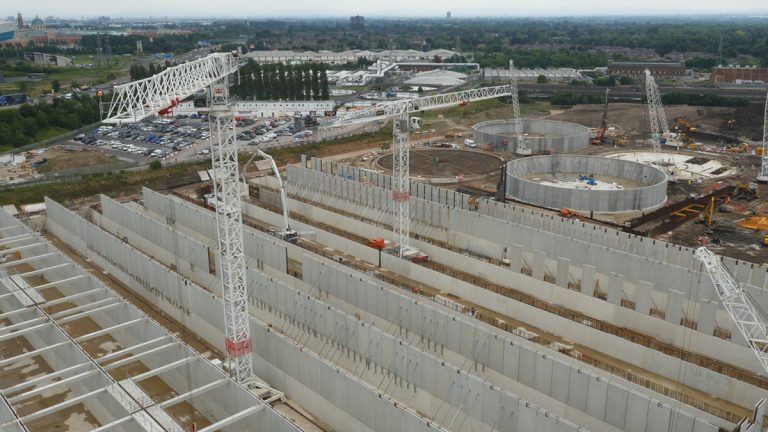
Installation of precast elements of the ASP via tower cranes – Courtesy of United Utilities and Laing O’Rourke
The ASP structure
The structure is built on 1,877 (No.) CFA piles (600mm diameter), varying in length from 26m to 28m, with a combination of end bearing and friction piles. The tank base is 500mm deep and was constructed in 30 pours commencing in November 2015. There are 23,582m3 of concrete in the base and in situ walls and 3,663 tonnes of reinforcement steel.
The ASP structure is constructed from a total of 2,013 (No.) precast components; including twin-wall panels, tie-beams, walkways and lattice panels which are installed using two rail-mounted tower cranes with 11T lift capacity at 40m.
Gantry cranes were used to simplify the installation and relocation of formwork for the in situ wall sections. These are due for completion by early August 2016 with completion of the structure by November 2016.
To minimise operating costs, the design team proposed a static mixing solution located in the common inlet channel on the tank. Together with Hydrotec Consultants the design team has developed a cross-vane static mixer that promotes natural mixing via changes in lateral and vertical direction. The arrangement has undergone extensive computational flow dynamics (CFD) analysis and physical modelling testing to ensure the resultant flow is fully blended and suitable for introduction into the activated sludge process.
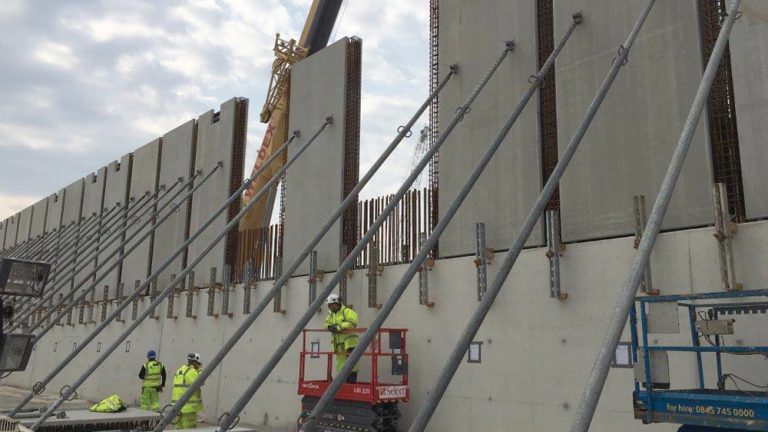
ASP under construction showing hybrid twinwall system – Courtesy of United Utilities and Laing O’Rourke
Final settlement tanks (FSTs)
Following the ASP, flows are transferred to 10 (No.) FSTs via a single 10-way distribution chamber for the final stage of treatment. Each FST is formed from a cast in situ base with Abetong precast walls, similar to the PSTs. Each base contains 880m3 of concrete and 140 tonnes of reinforcement.
The innovative hydrostatic suction lift scraper assembly includes multiple flow control actuators for sludge draw-off from the scraper blades, combined with flow measurement from each tank for active control. RAS (return activated sludge) flows to the RAS/SAS (surplus activated sludge) PS where 4 (No.) canister pumps lift flows into the main inlet channel.
The logistics of the distribution pipework construction is critical to success in this area due to the availability of access routes and crane locations for MEICA installation; 4D modelling is being used extensively to plan and co-ordinate these works.
Site-wide improvements
The project will fully modernise the existing ASP2 plant automation, provision of a new SAS thickening process, and upgrade and renovate existing assets. Ceasing co-settling sludges in ASP2 will bring significant performance and operational benefits.
During construction, over 10km of new gravity process pipework, a site odour control network, a site incoming power supply and HV ring main system will be constructed and commissioned.
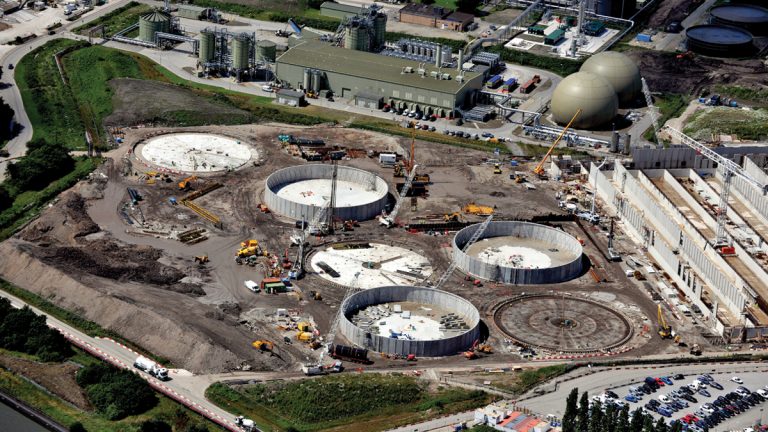
FSTs under construction – Courtesy of United Utilities and Laing O’Rourke
Site roads will also be modernised and a dedicated access for tanker deliveries is being developed away from the current road which runs through a residential area, this will provide significant social benefits and improve relationships with the site’s neighbours.
All new and existing works will be integrated with the existing distributed control system (DCS) used currently at the SPARC facility. Complex coordination is required as there are multiple shutdowns on existing essential plant, as the migration of control from ladder logic to DCS must be done under live conditions. The risks associated with shutdowns are mitigated by conducting detailed studies of the existing control system, operator interviews and the reverse creation of functional design specifications from knowledge obtained on site and operations liaison.
Prior to implementation each re-engineered control system to be migrated will undergo rigorous factory testing. During migration, the original control infrastructure will continue to operate parts of the system on a standby basis.
With both systems working initially side by side, the new system can easily be easily reverted back to the old system should there be any difficulties during commissioning.
Building information modelling (BIM)
BIM is already enhancing the way projects are delivered and is integral to the future success of the Davyhulme project. The project relies heavily on the BIM execution plan, the information exchange across the Projectwise Common Data Environment (CDE) and the use of a single federated model combining civil, structural, MEICA, geotechnical, DfMA and supplier models, and information into a single reference point for coordination and dissemination.
This provides a BS 1192-compliant workflow with an audit trail of changes throughout the process, controlling access to information and improving the efficiency of design iteration and quality assurance (QA) procedures.
Over 1,000 site photos, as-built drawings, trial pits, 5TB of LiDAR point-cloud survey and over 100 maps of existing services were used to shape the design in a digital environment.
Once an element has been modelled, it can be used to support the development of construction methods and sequencing, as well as being used by the workforce in preparation of specific task sheets and detailed method statements. The use of BIM and 3D modelling has improved the construction programme for the FST and ASP areas. By providing a 4D visualisation, each delivery and construction activity can be reviewed with key stakeholders to ensure constraints and pinch points are identified and mitigated.
The digital model is an essential tool to assist in visualising steps in the design and construction phase and has been used in design reviews, HAZOPs, Access and Lifting and Collaborative planning sessions. It provides key stakeholders with a representation of layout changes and highlights problems and constraints before they physically occur on site.
At completion, as-built models verified by point-cloud survey and linked design documentation will be transferred to United Utilities to create a Digital Asset Information Model. This is a user-friendly graphical portal, fully integrated with the UU Asset Management System.
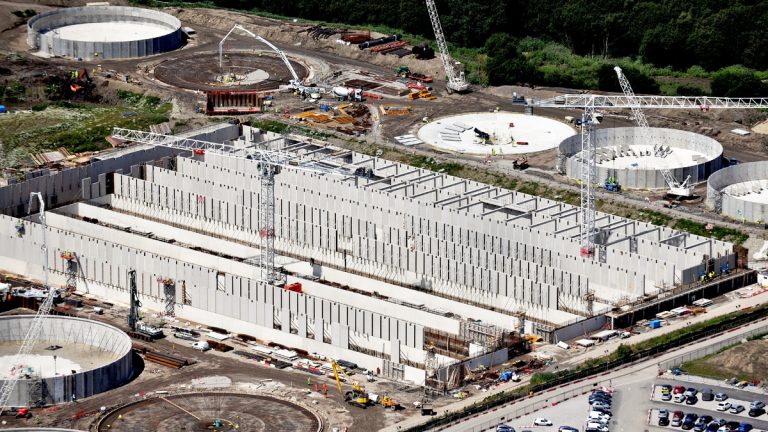
Davyhulme WwTW modernisation – Courtesy of United Utilities and Laing O’Rourke
Conclusion
The project is currently on schedule with construction well progressed on what is an extremely challenging programme. Work is being undertaken on numerous interfaces across the site and the success of the project is dependent upon completion of these activities whilst not compromising the site operational capability.
Members of the Davyhulme team have been integrated into the delivery team and a comprehensive operations readiness plan is being implemented to ensure a smooth transition between the new and the existing facilities. The project team has worked together with a ‘one team approach’ to identify and successfully relocate multiple live services on the works, including HV diversions, high pressure and large diameter water and sludge lines.
There have been a number of significant process shutdowns and diversions which have posed significant challenges. These shutdowns have been managed collaboratively by United Utilities and Laing O’Rourke, with engagement of key stakeholders. The collaboration between all parties has helped to maintain the excellent safety record on-site with over 700,000 man hours worked accident free to date. This has been aided by the significant promotion and use of off-site manufacture where products are produced in a safe working environment.
Construction is scheduled for completion in summer 2017, with commissioning and optimisation phases running through to project completion in 2018. The continued teamwork, dedication and performance of the co-located United Utilities, Laing O’Rourke and supplier/sub-contractor team, (many of whom will transfer through the construction and commissioning phases of the project) will ensure that the project is on schedule and successfully achieves the required performance.
The renewed and extended treatment works will deliver increased reliability and performance with reduced operating costs making Davyhulme WwTW fit to meet the demands of the Manchester catchment it serves.
Editor’s Note
The follow up Davyhulme WwTW 2017: Commissioning Phase was published in UK Water Projects 2017 edition and a later publication in 2019 documenting the final stage of the Davyhulme WwTW Modernisation Project.

















